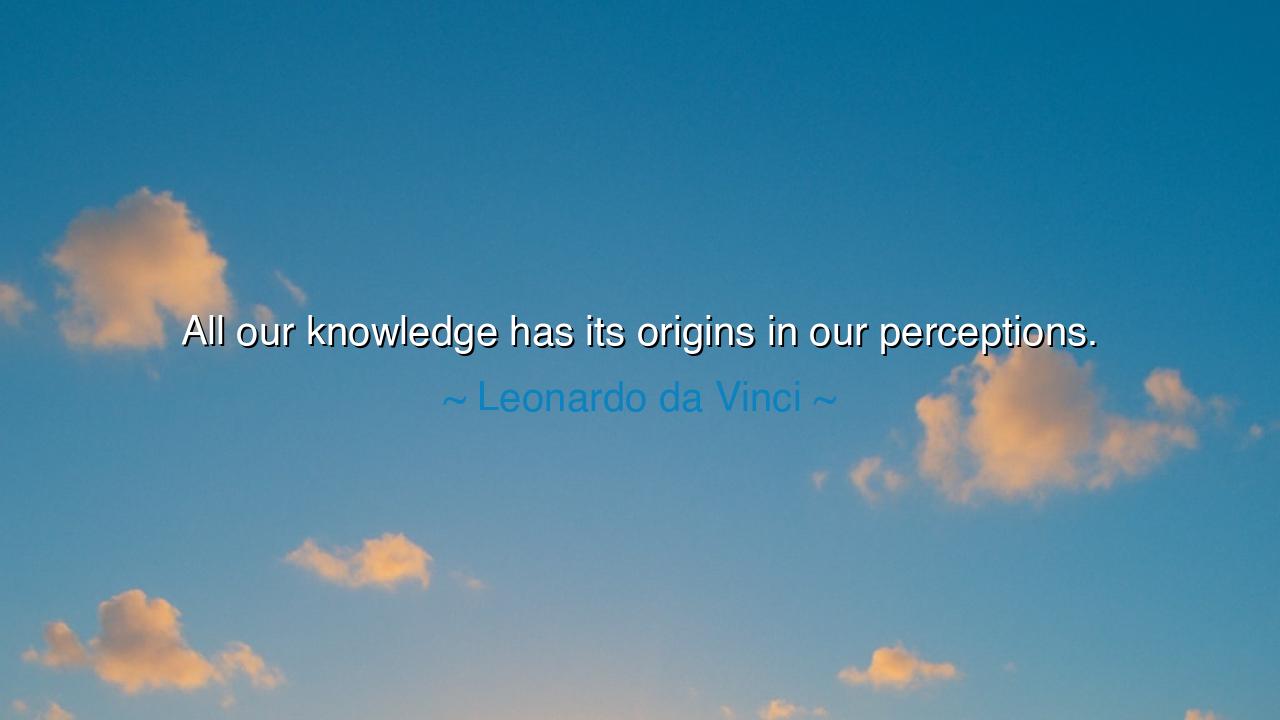
All our knowledge has its origins in our perceptions.






“All our knowledge has its origins in our perceptions.” — Leonardo da Vinci
Hear these words, O seeker of wisdom, and listen as the voice of Leonardo da Vinci, the great master of both art and science, speaks across the centuries. In this simple yet profound saying, he reveals a truth that rests at the foundation of all learning: that perception — the act of seeing, hearing, feeling, and experiencing — is the mother of knowledge. For before the mind can reason, before the intellect can conclude, the senses must first awaken to the world. What we know is born first from what we perceive; every discovery, every truth, every work of genius begins as a whisper in the senses, a flicker in the eye, a tremor in the heart.
The origin of this wisdom is found in Leonardo’s own life — a man who lived not as a mere scholar of books, but as a student of nature herself. He, who painted the Mona Lisa and studied the flight of birds, who dissected the human body and designed machines of war and wonder, did not separate art from science or beauty from understanding. To him, knowledge was not something confined to scrolls or sermons — it was alive, breathing in every color, every form, every motion. He observed the world as one observes a divine manuscript written in the language of light and shadow. “All our knowledge,” he said, “has its origins in our perceptions” — for he knew that the senses are the gateways of the soul, through which truth enters and wisdom is born.
In Leonardo’s time, many believed that knowledge came from authority — from what the ancients had written or what the church declared. But Leonardo, like a prophet of reason, turned his gaze instead toward the world itself. He studied how water flowed, how muscles stretched, how clouds gathered and dissolved. He trusted what he saw more than what he was told. From perception, he drew patterns; from patterns, understanding; from understanding, creation. His genius was not divine accident — it was the fruit of deep observation. And thus his words endure: the eyes and the mind are not separate — they are partners in the eternal dance of discovery.
Consider the story of Isaac Newton, centuries after Leonardo’s time. When the apple fell before him, it was not a book or lecture that revealed to him the law of gravity — it was perception. He saw what all others had seen, but he perceived what none had understood. In that moment, knowledge was born not from repetition, but from attention. For to perceive deeply is to see beyond appearances; it is to hear the silent language of truth. The wise are not those who see more things, but those who see more deeply into what they behold.
So too must we learn this ancient art of perception. In an age drowned by noise and haste, the eyes of the spirit grow dull, and men mistake information for knowledge. They look but do not see, they hear but do not listen. Yet Leonardo’s wisdom calls us back to the sacred stillness of observation. To perceive is not merely to sense — it is to awaken. It is to look upon a leaf and see the miracle of its veins, to hear the wind and feel the pulse of the earth, to gaze upon another soul and glimpse the reflection of eternity. In every detail of life lies a lesson, waiting for the eye that can perceive it.
The lesson, then, is this: train your senses as a warrior trains his sword. Look not with haste, but with reverence. Observe, and let the world speak to you in its silent eloquence. For every great truth begins as a moment of perception — a spark that, when tended by thought, becomes the flame of understanding. Do not despise small moments, for within them lies the seed of revelation. The philosopher, the artist, the scientist — all drink from the same spring: the well of perception.
Therefore, O child of reason and wonder, remember Leonardo’s wisdom. Seek first to perceive before you presume to know. Let your eyes be open, your mind humble, your heart attentive. Do not rush to judgment, but let observation ripen into understanding. The more you truly see, the more you will discover that knowledge is not a possession but a living relationship between the mind and the world. And when your perception deepens, knowledge will cease to be mere information — it will become illumination.
For all our knowledge has its origins in our perceptions, and he who learns to perceive truth in all things walks the path of the masters — the path where seeing becomes knowing, and knowing becomes wisdom.






AAdministratorAdministrator
Welcome, honored guests. Please leave a comment, we will respond soon